Dental Implants
Specialists in New Teeth Implants
Dental implants are a great way to enhance your smile, improve the functionality of your teeth and boost your confidence.
Providing one of the closest replacement options to complement your natural healthy teeth, dental implants are now more accessible than ever before and are inserted directly into your jawbone using titanium screws to mimic your natural tooth.
Whether you have lost a tooth or the movement of your existing teeth are limited, this is a fantastic way to restore bite force, prevent changes in the shape of your face, optimise comfort and improve their appearance.
How Do Dental Implants Work?
Once it has been established by your dental practitioner that dental implants are the best solution for you and that you are happy to proceed with the treatment, your dentist will talk you through each stage of the procedure.
The procedure involves your dentist firstly removing the damaged tooth, and then cutting into your gum in order to drill a small hole into the jawbone. Trust us, it isn’t as gruesome as it sounds, and your mouth will be numb throughout the procedure. Once the hole has been created, the implant is then inserted and your gum is closed with stitches. For some patients, stitches are not required.
Stages of Dental Implant Treatment
We’ve outlined the common stages of all dental implant treatments so that you can determine whether this is the best option for you and of course, fully understand what is involved in the procedure.
-
Tooth removal
All dental implant treatments begin by removing your existing tooth so that there is space for the implant to be inserted. If you are fit, well and healthy, and there’s no other reason which could compromise the success of the treatment, your dentist will insert the implant straight after extraction.
-
Placing the dental implant
Your dental practitioner will then place the dental implant into your gum using a titanium screw. The gum is then stitched to prevent bacteria from causing issues.
-
Healing time
You can expect to wait anywhere between 3 and 6 months for the abutment to fully bond with the jawline. Once your specialist is happy that the gum has settled around the gum, they will then consider moving onto the next stage. During the healing time, most professionals will provide you with a temporary denture.
-
Fitting the implant
Once the gum has healed, your new porcelain implant crown can then be fitted. This is made to enhance your natural teeth.
Types of Dental Implants
Dental implants are a long-lasting tooth replacement method. This state-of-the-art dental treatment provides ideal solutions to restore your smile with a full functional and natural-looking teeth. At Boutique Dental 23 we have a team of professional dental implants specialists ready and waiting to help.
-
Single Tooth Implant
A dental implant works by embedding a titanium device (like a small metal post or plug) where your root would previously have sat below the gum line. From here, an artificial tooth can be attached/added/fixed, which I ensure looks the same as your surrounding natural teeth.
Dental implants are ideal for replacing a single missing tooth because unlike a dental bridge, dentists do not need to damage the neighbouring teeth to anchor the restoration.
-
Multiple Teeth Implants
Dental implants can also be used to replace multiple missing teeth or even full arches top / bottom teeth. This can be achieved by fitting a number of single implants or creating a dental bridge, featuring a number of teeth and fixing this to two or more implants. As with implants for a single missing tooth, implants for multiple missing teeth look natural and will fully restore your bite, function and the aesthetics of your smile.
Dental implants are a long-lasting tooth replacement method. This state-of-the-art dental treatment provides ideal solutions to restore your smile with a full functional and natural-looking teeth.
Benefits of Dental Implants
There’s a whole host of benefits that come hand in hand with dental implants, making it a great treatment if you are looking to improve both the look, feel and functionality of your smile.
Here are some of the benefits:
- They look and feel like your natural teeth
- They are a long term solution
- They prevent bone loss
- They retain your facial structure
- You can eat and drink what you want – they optimise chew power!
- Enjoy clearer speech
- They are a permanent fixture
Finally, unlike dentures, you won’t have to worry about them slipping out.
How to Look After your Dental Implants
To ensure that your dental implants last as long as possible, it’s crucial that you take good care of them.
For example, it’s important that you….
- Avoid all abrasive products
- Practice excellent oral hygiene
- Floss frequently
- Avoid sticky or hard foods
- Avoid smoking
- Avoid alcohol
- Make sure you visit the dentist on a regular basis
Get the smile you deserve and we’ll take care of you!
Schedule Your Dental Implant Treatment Today! Call 01942 727465 to find out how to get dental implants in Wigan. Know how to prepare for the procedure, how long it will take as well as what to expect during the surgery.
Before and After Examples of Implants
Check out the smile transformations and how dental implants improved the confidence of our countless patients.
Before | After
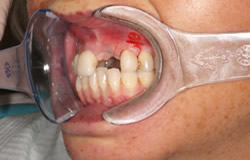
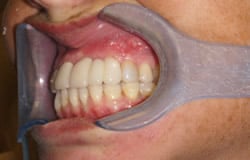
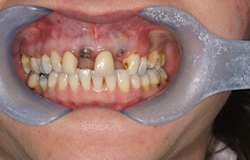

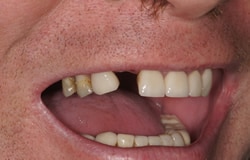
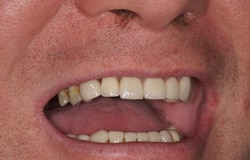
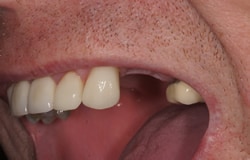
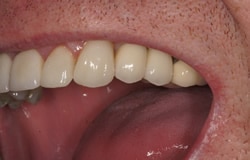
Treatment FAQs
1. What are dental implants?
Dental implants are surgically implanted into the jaw with a titanium abutment screw, and provide support for artificial teeth, such as crowns or bridges. This treatment is mostly used to restore a person’s ability to chew or the appearance of teeth.
2. Who is a good candidate for dental implants?
A good candidate for dental implants must have healthy gums and bone that are strong enough to sit around the implant. You must also be of an age where your jawbone has stopped growing. Of course, your dentist is the best person to ask if you are a good candidate for this treatment.
3. Are dental implants painful?
As with any surgical procedure some discomfort may be experienced however a local anaesthetic is used to ensure it is pain free. Does it hurt? A little more drilling than fillings, but thanks to anaesthetics there is no pain. Read our blog about why dental implants are not as painful as it sounds.
4. How many days does the implant pain last?
In the vast majority of cases, discomfort remains at its peak for around 3-5 days after your treatment; however, by the end of your first week post-surgery, you should notice that the pain is subsiding.
5. How long does the dental implant treatments procedure take?
The procedure takes 1 hour or more.
6. How long do dental implants last?
Dental implants last up to 40 years.
7. What are the success rates for dental implants in your practice?
Currently 100% succsess rate.
8. Can a dental implant be done in one day?
es an implant is placed in one day after a consultation, several appointments after this are needed.
9. I have some of my own teeth. Can I still have implants?
Of course, one of the main benefits of choosing dental implants is that you can have any number of teeth replaced, whether you need a single tooth or a complete set.
10. Do I have an implant for each missing tooth?
If you are missing just one tooth, your dentist will place a single implant into the jawbone; however, a single dental implant can also be used to replace two adjacent teeth.
11. Are the implant teeth difficult to clean?
Dental implants can be challenging to clean however, there are lots of products and techniques that you can use to clean them thoroughly. For example, it is essential to keep up regular brushing, flossing and proper dental implant care.
12. How much do implants cost?
In the UK, dental implant costs vary depending on the dentist you use. Generally, dental implant treatments start from £2300.
13. Do you get put to sleep for tooth implant?
In the majority of cases, implant dentistry is performed under local anaesthesia.
14. Can you get a temporary tooth while waiting for an implant?
Most dentists will not leave you without a tooth and will provide you with a temporary denture to fill the gap whilst your gums heal.
15. If I had gum disease when I had my own teeth, would I get it with the implants?
No, however, you do need healthy and strong gums to be a suitable candidate for this type of treatment so if you have gum disease, it’s highly likely that your dentist will not proceed with the treatment.
16. Will the implant procedure require a bone graft?
Yes and there are several different types of bone graft used depending on the extent of the damage to your teeth.
17. What happens if the implant does not fuse with the bone?
If your dental implant does not fuse properly to your jawbone, your dentist will need to see you in order to identify a new treatment plan for the failed implant.
18. Can a failed implant be fixed?
This all depends on the severity of the damage. Each case is assessed on an individual basis.
19. Can an implant be removed and replaced?
Yes, it is possible to remove and replace an implant.
20. How many times can you replace an implant?
Providing the implant is maintained with proper hygiene checks, your implant could last a lifetime. Many people do require their implant to be replaced every 15–20 years, however.
21. Is a dental implant covered by insurance?
Most dental insurance tends not to cover implant dentistry.
You may be interested in reading: Discover the Advantages of Dental Implants
How Can We Help?
Please complete the form below for a Call Back.

